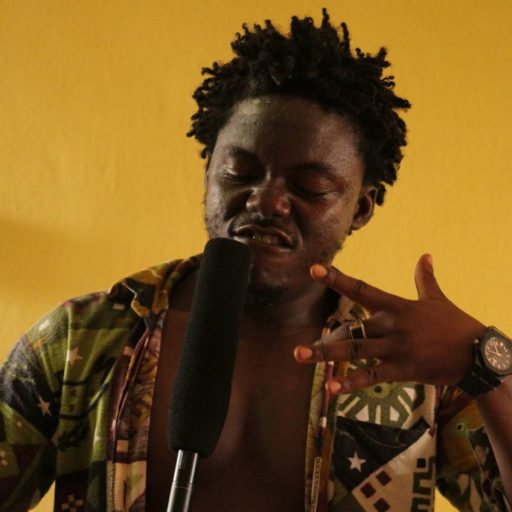Zakiyyah Dzukogi: What is the process of writing a poem like for you? Is it a lot of hard work or easy?
Saddiq Dzukogi: For me, writing has to be an enjoyable process. This is not to say it isn’t rigorous when it needs to be— but I feel like the collective rigour of years of study allows me to enjoy it now. But that wouldn’t be a complete truth. I have always, exclusively, found joy in writing. The process has no difficulty. Writing a poem, for me, is like weaving. Each word, carefully and, sometimes, carelessly chosen, made into a thread, each word a puzzle piece to be placed in the perfect spot, each line, its complete universe—a world of the story to be confronted with care and attention. The blank page is a sacred playground where I discover the genesis of the fountain of my emotions— where my words hum and twirl into fully formed apparitions— sometimes the poem is a river, gushing downhill— other times it is the frail legs of the old, climbing a mountain. So, as you can see, I am not sure.
Zakiyyah Dzukogi: Please describe your sense of identity in this or any possible world in imagery or metaphor.
Saddiq Dzukogi: I want to say a chameleon— but that doesn’t cut it. Because a chameleon camouflages, meaning it’s not real. It’s an illusion. As a writer, my sense of identity is constantly evolving and shaping itself through my experiences, my observations and my imagination. I adapt myself to my realities, to come up with a voice that transcribes them in a way that is accurate and precise to the emotions of those moments. I love to think my identity as a writer is a dynamic and ever-changing thing, much like life itself.

Zakiyyah Dzukogi: If any of your poems could literarily save a person’s life, which poem would it be and can you describe the person whose life you think it would have saved?
Saddiq Dzukogi: As a writer, it is difficult for me to choose one specific poem that could save a person’s life, as the power of poetry lies in its ability to resonate with different individuals in unique ways. I cannot answer this question. What I can answer is that every poem I write not only saves my own life but immortalizes it.
Zakiyyah Dzukogi: What does Africa mean to you, as potential or reality?
Saddiq Dzukogi: It has to be both. As a reality, it means we’ve stagnated. We are moving towards our dreams. The potential is there. And their dream would be realized. Africa is a vast and diverse continent of beauty and uproar— of rich histories and cultures. It holds immense promise despite the enormous challenges.
Zakiyyah Dzukogi: Could you share with us one poem you’ve been most impressed or fascinated by? Tell us why and share your favourite lines from it.
Saddiq Dzukogi: I am a child and lover of many poems, so it’s hard for me to choose just one. However, there are a few that have had a profound impact on me over the years. TS Eliot‘s “The Love song of J Alfred Prufrock” is one of them. This poem gave me permission to break free from the conventions of tradition and create a style of writing that speaks to my sensibilities, insights, and language. I admire the use of repetitive phrasing and fragmented syntax in the poem, which creates a sense of fragmentation and echoes the speaker’s sense of psychological paralysis.
Another poem that has touched me deeply is Wisława Szymborska’s “Photograph from September 11.” This powerful and moving poem manages to write about the victims of a tragedy with dignity and respect, without resorting to dehumanizing them. Instead, it focuses on the aftermath of the tragedy and how the photograph preserves the victims in a venerable manner.
Lastly, Kwame Dawes‘ recent poem “Eshu or Ambition” speaks to themes of identity, transformation, and the struggle for artistic greatness. The poem centres around the story of blues musician Robert Johnson and acknowledges the fraught nature of the relationship between ambition and gratitude, as well as the delicate balance between self-improvement and self-destruction. These poems have served as both permission and council for my writing, and I often return to them when I need inventiveness or guidance.
Saddiq Dzukogi is a Nigerian poet and assistant professor at Mississippi State University’s Department of English. He is the author of Your Crib, My Qibla, a highly-acclaimed poetry collection which has earned him the 2022 Derek Walcott Prize for Poetry, and the 2021 Julie Suk Award as a co-winner.
- Poet’s Talk: 5 Questions with Nasiba Babale - September 5, 2023
- Poet’s Talk: 5 Questions with Ibraheem Uthman - August 29, 2023
- Poet’s Talk: 5 Questions with Zakiyyah Dzukogi - August 19, 2023

















Leave a Reply